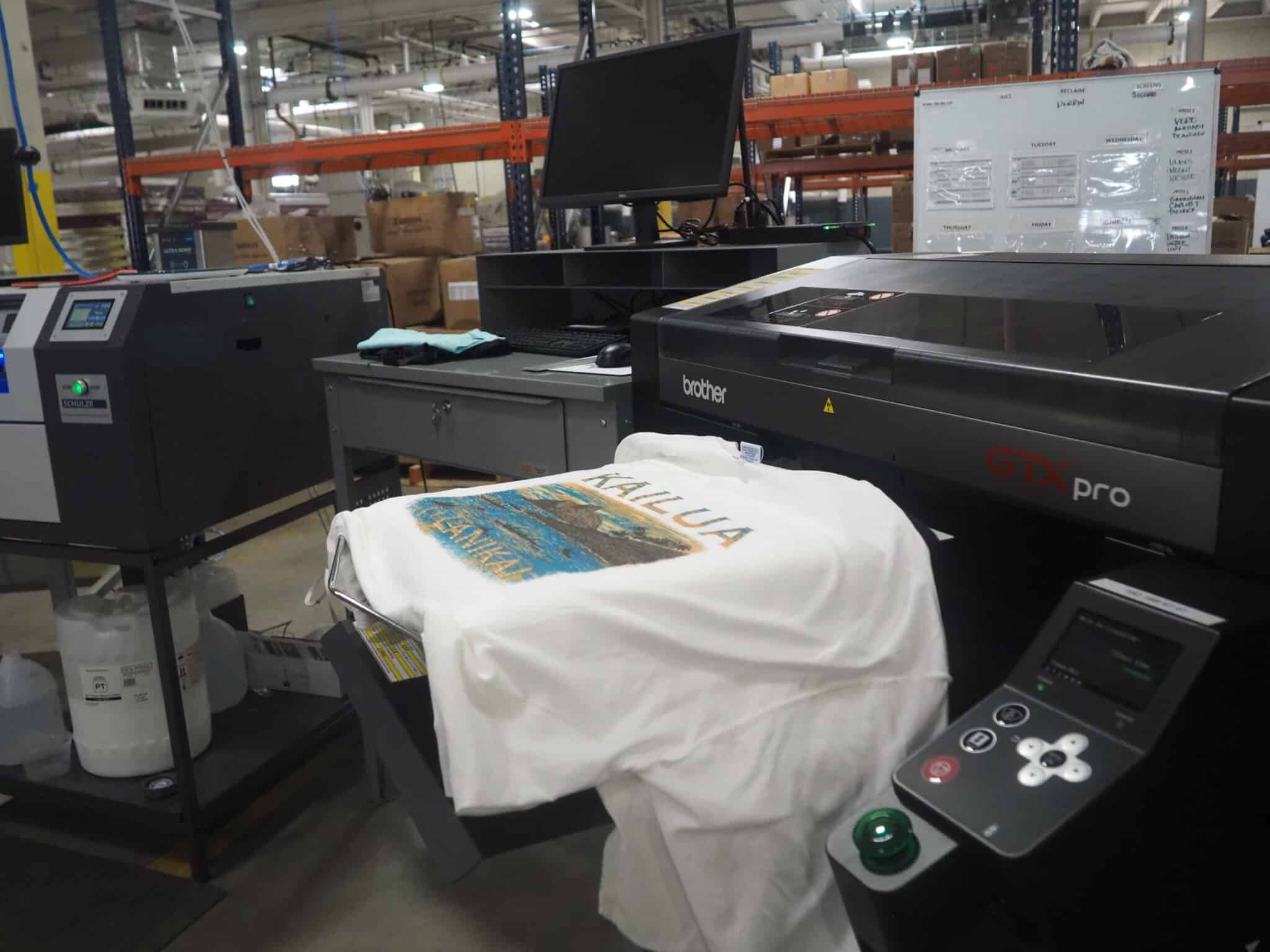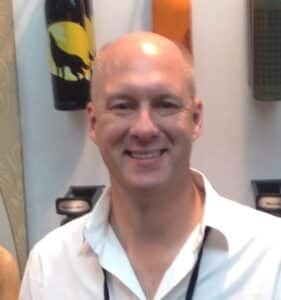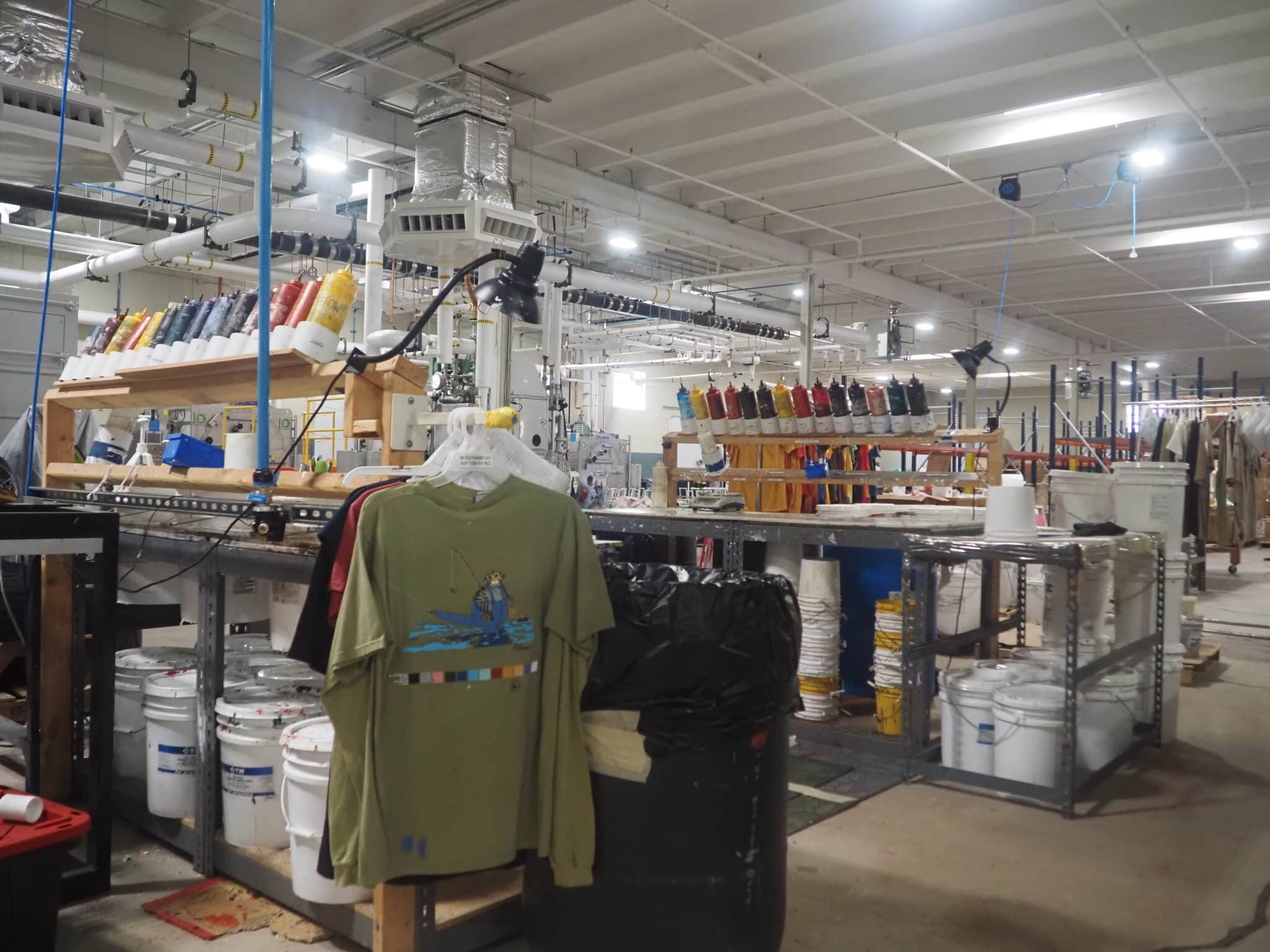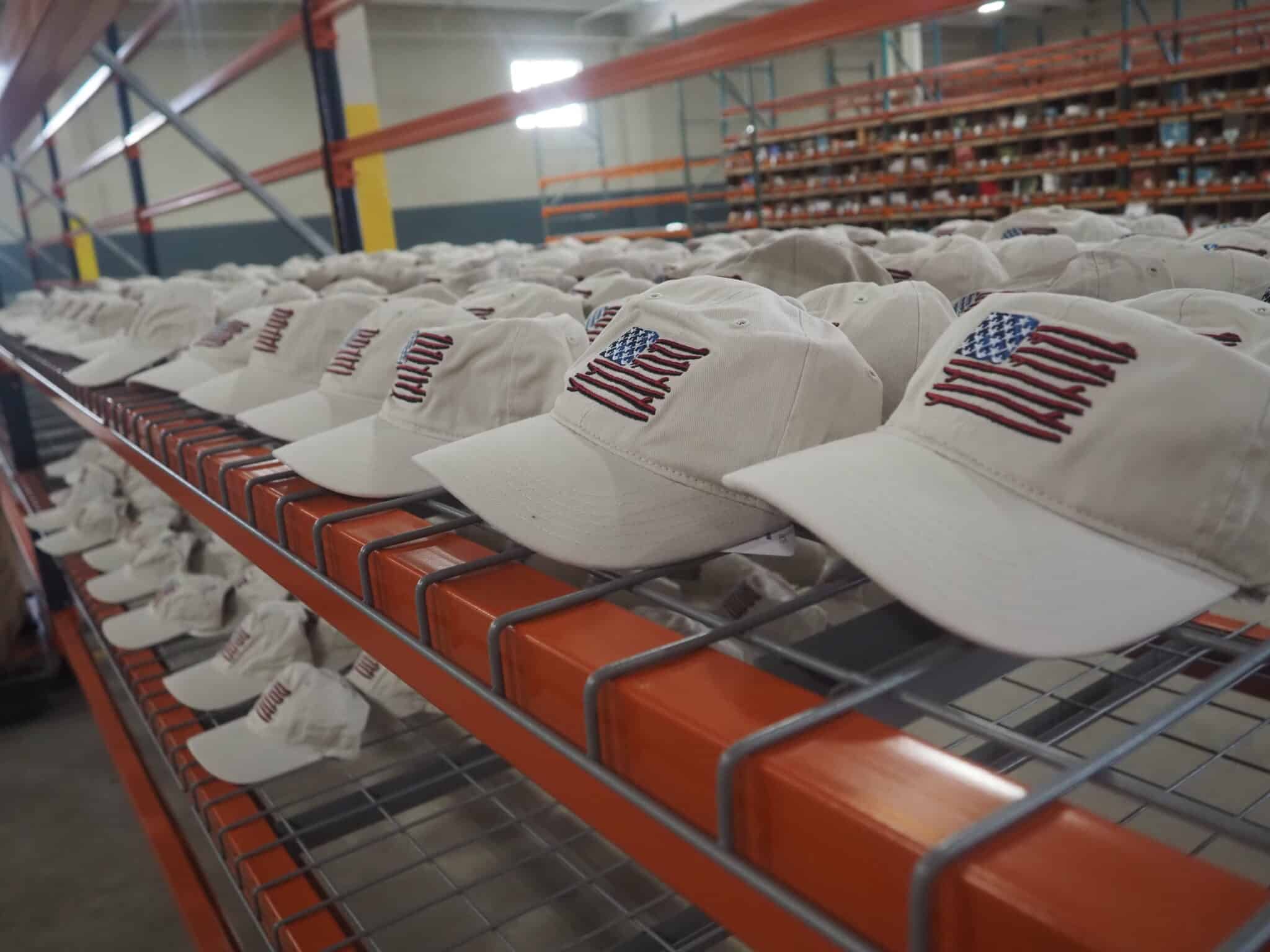
T-shirts laid out on a machine within Crazy Shirt’s new Denver facility. (Maia Luem/BusinessDen)
If you buy a T-shirt from Honolulu-based Crazy Shirts, it will probably have been made in Denver.
The 59-year-old T-shirt manufacturer is shifting its local operations to 4747 Ivy St., a move that will allow the majority of its manufacturing and distribution to take place in Denver.
Crazy Shirts — which has 34 brick-and-mortar stores in resort areas, including Vail — was founded and still operates in Hawaii, but expanded operations to Aurora about 10 years ago. It leased a small distribution center there that allowed the company to ship products via trucks rather than air.

CEO Mark Hollander
“Denver allowed us to maintain our service-level commitments, which were about three-and-a-half days from order to shipping, in the most cost-effective manner,” CEO Mark Hollander said.
But Hollander said Crazy Shirts wanted to not only increase its production, but also own its real estate. It bought the property on Ivy Street, in the Northeast Park Hill neighborhood, for $6.4 million in 2021, records show.
“It will allow us to undertake growth in a way we couldn’t,” Hollander said. “We were maxed out in the facility we had.”
Before moving, production was broken up. Crazy Shirts sent out materials to Los Angeles for dyeing and had only a small screen printing space in Aurora. At the new location, Hollander said, every piece of production will happen under one roof.

A paint-mixing station within Crazy Shirt’s new facility in Denver. (Maia Luem/BusinessDen)
“It allows us to maintain a lower inventory level because we’re pushing the goods out to the stores and consumers more quickly and turning goods more quickly,” he said.
Hollander said Crazy Shirts makes roughly 1.2 million shirts a year and has about 15,000 designs. In addition to its physical stores, the company also sells online.
To make a Crazy Shirt, the custom material is first dyed from plants like lavender and cinnamon or even beer and wine. Afterward, hand-mixed paints are screen-printed onto the shirt and the fabric is dried at 325 degrees and cured. Then it’s inspected, folded and sent out for distribution.
For comparison, Hollander said a standard T-shirt manufacturer purchases pre-dyed clothing “off the shelf” and uses harsh chemicals to screen-print.
Hollander said 40 employees work in Denver, and he plans to hire 60 more within the next few months. The new facility is 68,000 square feet. The existing building, formerly home to National Wood Products Inc., had to be completely renovated to fit a dye space, screen printing, distribution and offices.
“As we map out what the next 60 years are going to look like … it provided a ton of flexibility and was a great chance to move into a building that suited our needs and add to the facility over the future,” Hollander said.

Hats made by Crazy Shirts sit out in the company’s new Denver facility on Tuesday. (Maia Luem/BusinessDen)
Along with construction, Hollander said the company did a full upgrade, investing in “cutting-edge technology” and changing the way it uses energy. For example, it’s experimenting with new systems that complete every step of the manufacturing process on one machine.
The Ivy Street space was designed by Steve Lubowicki with Lubowicki Architects. Construction was completed by Williams Construction.
Williams Construction manager Jared Lundy said the new site uses recycled water, high-pressure steam piping and advanced air pumps, and lighting systems to cut utility costs.
“It really brought this 1967 building into the future,” Lundy said. “It’s a very unique … facility that is combining three different locations into one.”
Hollander said the facility allows the company to use about 60 percent less water than it otherwise might have. Pressure steaming, he said, makes for more high-quality shirts. He declined to disclose how much the company spent to build out the plant.

T-shirts laid out on a machine within Crazy Shirt’s new Denver facility. (Maia Luem/BusinessDen)
If you buy a T-shirt from Honolulu-based Crazy Shirts, it will probably have been made in Denver.
The 59-year-old T-shirt manufacturer is shifting its local operations to 4747 Ivy St., a move that will allow the majority of its manufacturing and distribution to take place in Denver.
Crazy Shirts — which has 34 brick-and-mortar stores in resort areas, including Vail — was founded and still operates in Hawaii, but expanded operations to Aurora about 10 years ago. It leased a small distribution center there that allowed the company to ship products via trucks rather than air.

CEO Mark Hollander
“Denver allowed us to maintain our service-level commitments, which were about three-and-a-half days from order to shipping, in the most cost-effective manner,” CEO Mark Hollander said.
But Hollander said Crazy Shirts wanted to not only increase its production, but also own its real estate. It bought the property on Ivy Street, in the Northeast Park Hill neighborhood, for $6.4 million in 2021, records show.
“It will allow us to undertake growth in a way we couldn’t,” Hollander said. “We were maxed out in the facility we had.”
Before moving, production was broken up. Crazy Shirts sent out materials to Los Angeles for dyeing and had only a small screen printing space in Aurora. At the new location, Hollander said, every piece of production will happen under one roof.

A paint-mixing station within Crazy Shirt’s new facility in Denver. (Maia Luem/BusinessDen)
“It allows us to maintain a lower inventory level because we’re pushing the goods out to the stores and consumers more quickly and turning goods more quickly,” he said.
Hollander said Crazy Shirts makes roughly 1.2 million shirts a year and has about 15,000 designs. In addition to its physical stores, the company also sells online.
To make a Crazy Shirt, the custom material is first dyed from plants like lavender and cinnamon or even beer and wine. Afterward, hand-mixed paints are screen-printed onto the shirt and the fabric is dried at 325 degrees and cured. Then it’s inspected, folded and sent out for distribution.
For comparison, Hollander said a standard T-shirt manufacturer purchases pre-dyed clothing “off the shelf” and uses harsh chemicals to screen-print.
Hollander said 40 employees work in Denver, and he plans to hire 60 more within the next few months. The new facility is 68,000 square feet. The existing building, formerly home to National Wood Products Inc., had to be completely renovated to fit a dye space, screen printing, distribution and offices.
“As we map out what the next 60 years are going to look like … it provided a ton of flexibility and was a great chance to move into a building that suited our needs and add to the facility over the future,” Hollander said.

Hats made by Crazy Shirts sit out in the company’s new Denver facility on Tuesday. (Maia Luem/BusinessDen)
Along with construction, Hollander said the company did a full upgrade, investing in “cutting-edge technology” and changing the way it uses energy. For example, it’s experimenting with new systems that complete every step of the manufacturing process on one machine.
The Ivy Street space was designed by Steve Lubowicki with Lubowicki Architects. Construction was completed by Williams Construction.
Williams Construction manager Jared Lundy said the new site uses recycled water, high-pressure steam piping and advanced air pumps, and lighting systems to cut utility costs.
“It really brought this 1967 building into the future,” Lundy said. “It’s a very unique … facility that is combining three different locations into one.”
Hollander said the facility allows the company to use about 60 percent less water than it otherwise might have. Pressure steaming, he said, makes for more high-quality shirts. He declined to disclose how much the company spent to build out the plant.
